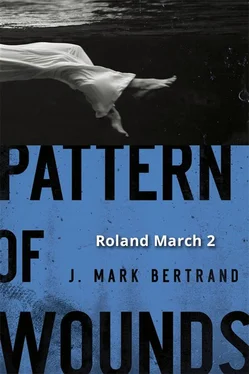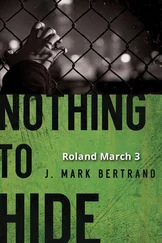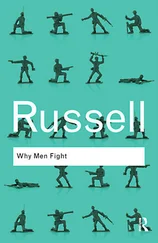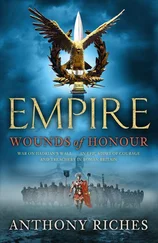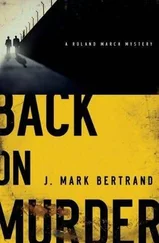J. Bertrand - Pattern of Wounds
Здесь есть возможность читать онлайн «J. Bertrand - Pattern of Wounds» весь текст электронной книги совершенно бесплатно (целиком полную версию без сокращений). В некоторых случаях можно слушать аудио, скачать через торрент в формате fb2 и присутствует краткое содержание. Год выпуска: 0101, Издательство: Baker Publishing Group, Жанр: Полицейский детектив, на английском языке. Описание произведения, (предисловие) а так же отзывы посетителей доступны на портале библиотеки ЛибКат.
- Название:Pattern of Wounds
- Автор:
- Издательство:Baker Publishing Group
- Жанр:
- Год:0101
- ISBN:нет данных
- Рейтинг книги:3 / 5. Голосов: 1
-
Избранное:Добавить в избранное
- Отзывы:
-
Ваша оценка:
- 60
- 1
- 2
- 3
- 4
- 5
Pattern of Wounds: краткое содержание, описание и аннотация
Предлагаем к чтению аннотацию, описание, краткое содержание или предисловие (зависит от того, что написал сам автор книги «Pattern of Wounds»). Если вы не нашли необходимую информацию о книге — напишите в комментариях, мы постараемся отыскать её.
Pattern of Wounds — читать онлайн бесплатно полную книгу (весь текст) целиком
Ниже представлен текст книги, разбитый по страницам. Система сохранения места последней прочитанной страницы, позволяет с удобством читать онлайн бесплатно книгу «Pattern of Wounds», без необходимости каждый раз заново искать на чём Вы остановились. Поставьте закладку, и сможете в любой момент перейти на страницу, на которой закончили чтение.
Интервал:
Закладка:
I close my eyes. When I open them, someone’s on top of me, pinning my arms under the weight of her legs. Tammy and her pillow, torturing and laughing, laughing and torturing. When I really awaken, there’s a pillow against my face. But it’s Charlotte’s and my only attacker is me.
I crawl out of bed sometime around three and pad down the stairs, taking a bottle of water from the fridge. I sit in an armchair in front of the glowing TV, holding the bottle against my temple and then taking another swig.
I’m alone.
Alone in the house and alone on the case. In the past, even at my low points, there was always someone I could rely on. Once it was Wilcox. After that, for a short time, it was Theresa Cavallo. But they’re not with me now. If anything, they’re on the other side. And while Aguilar is as good a cop as any to take a statement or run through a checklist, he’s unimaginative, and as partners we keep pretty much to ourselves.
When you’re alone, there’s no one else to tell you the things you don’t want to hear.
So I tell myself.
I’m not satisfied with Templeton’s version of events, and I know I’ll get nothing better out of Lauterbach. But according to the writer, someone else was there. Asking all the right questions. Overjoyed to be part of the process. She may have tried to suffocate me as a child, and the way she’s turned my cousin into a self-serving cause célèbre might disgust me, but the fact is, Tammy was there. And if I want the full story, she’s the only one to ask.
I switch the television off and return the water to the fridge. Upstairs, I fall onto the bed, pushing my face into the pillow, and fall asleep.
CHAPTER 24
WEDNESDAY, DECEMBER 16–10:00 A.M.
In my black funeral suit I could pass for a reject from Reservoir Dogs . All I need are the shades. After wearing my father-in-law’s wardrobe for so long-not my own yet, not in my mind-the fabric feels stiff, the squared shoulders like a set of football pads. In his dark jeans and windbreaker, Aguilar blends better with the other mourners, a small group of no more than a dozen, most of whom are dressed down despite the occasion. The morning fog has burned off, promising light gray skies. I get a few looks from other people as we slip inside the funeral home. They’re probably mistaking me for an undertaker.
Beneath a wash of artificial light, the white casket gleams, half open in a foam of colorless flowers, the distant face of Simone Walker pale as the rest. The monochromatic tableau lends an inappropriate beauty to the scene. Her mother, Candace, sits between two larger women, co-workers judging by their single-minded devotion to her grief, which doesn’t touch them personally. A few rows behind, Joy Hill maintains her icy composure, eyes fixed on the coffin as if she’s afraid to look away.
A prerecorded organ dirge fills what would otherwise be an awkward silence, harmonizing the whispers of a few young women near the back with the occasional sob from Candace Walker’s direction. Aguilar slips into the rear pew, unzipping his jacket. I advance down the center aisle to pay my respects. The jigsaw of stained glass in the arrow-slit windows casts colored rays across the empty seats.
I nod at Dr. Hill. She takes no notice.
Each of the women beside Candace grips one of her hands tight. Her lip trembles and a line of fresh tears travels over the swell of her cheekbone into the depression of her cheek. She looses a hand to wipe it away, then presses her wet fingers into mine.
“Thank you for coming,” she says. “I know it means so much to her.”
No stranger to grieving mothers, I whisper a few words of sympathy and pull away.
At the casket, I gaze on Simone’s face. Its startling placidity and all the layers of makeup leave me with the uncomfortable feeling that regardless of my tireless efforts, I’ve never really seen her before now, and wouldn’t recognize her if she walked up to me on the street.
I know her as symbol: the Victim. When we die, if there’s to be any recompense, it’s left to strangers to make. I know her only as a corpse, a medium for her killer to communicate through, a repository of evidence.
As I return down the aisle, the back door opens and Sean Epps slips through. He hides a shiner behind his sunglasses and looks like someone stuffed his right cheek with cotton. He files down a pew toward the front, settling himself with a creak that draws every eye. None of the women seem to recognize him. Dr. Hill would, but again she doesn’t glance over.
“Did you get a look at him?” Aguilar whispers. “I wonder what the other guy looks like.”
“Yeah,” I say, thinking of Jason Young.
The minister emerges from a door up front. He keeps a brief vigil at the casket, says a few hushed words to Candace. He takes his place behind the lectern and opens in prayer. The eulogy that follows is so full of platitudes and borrowed anecdotes that it’s soon clear he knew Simone no better than I did.
Aguilar leans over. “Catholic funerals are better than this.”
“I don’t think she minds.”
The man tells a story of Simone’s childhood, a time she’d found her mommy upset about something and told her not to cry. He sentimentalizes the tale, making it sound like something that transpired between June Cleaver and a baroque cherub, and ends by gazing misty-eyed in Candace’s direction, saying, “Even as a little girl, she brought so much joy to her mother. She dried so many tears.”
Candace sobs, prompting her minders to close in.
The double doors open again, this time to reveal a tentative-looking man in his mid-to-late twenties, unkempt, with thick black eyebrows and a dense twist of hair. He looks around, keeping his hands buried in the pockets of his knit pullover. Seeing me and Aguilar, he creeps across the carpeted aisle and slides into the pew in front of us.
I lean forward, whispering over his shoulder. “David Bayard?”
He turns slightly, nodding his head.
“Did you know Simone?”
He seesaws his hand, then lowers it quickly, self-conscious in the funeral setting. “Not really,” he whispers. “Only by sight.”
Several of the young women across the aisle glance over. David freezes.
“We’ll talk afterward,” I say, giving his shoulder a reassuring pat. “Thanks for coming.”
When I sit back, Aguilar gives an imperceptible shake of the head. Whether it’s directed at me or at the Bayard kid, I can’t tell.
We don’t accompany the mourners to the graveside. In the parking lot, I guide David Bayard Jr. toward our car. As a college student, I’d pictured him younger. As a scion of West University, I’d pictured him better turned out. Jack Hill’s description of him: a professional student. I’d pictured a young slacker, but there’s a calm intelligence in David Junior’s eyes, a self-possession overshadowed by his nerves.
Fortunately, what Jack Hill said about his willingness to talk proves entirely accurate. I’d sensed as much over the phone when he returned my call early this morning. Anxious to talk. Ready to tell me everything he knows. The anger flaring in his even voice at the first mention of his father’s name. Silence at the news of Agnieszka Oliszewski’s vicious murder, which was news to him.
“Sit tight for a second,” I tell him.
He leans against the car, hands in pockets, shoulders hunched up like he’s freezing in the mid-fifties weather. Aguilar walks a few paces away to make a call. I motion for him to stick near David, then jog across the parking lot to where Sean Epps is getting into his car.
“Mr. Epps, hold on a second.”
He pulls the door shut and starts the engine.
I catch up, rapping my knuckles on the glass. After a pause, the window buzzes down.
Читать дальшеИнтервал:
Закладка:
Похожие книги на «Pattern of Wounds»
Представляем Вашему вниманию похожие книги на «Pattern of Wounds» списком для выбора. Мы отобрали схожую по названию и смыслу литературу в надежде предоставить читателям больше вариантов отыскать новые, интересные, ещё непрочитанные произведения.
Обсуждение, отзывы о книге «Pattern of Wounds» и просто собственные мнения читателей. Оставьте ваши комментарии, напишите, что Вы думаете о произведении, его смысле или главных героях. Укажите что конкретно понравилось, а что нет, и почему Вы так считаете.
